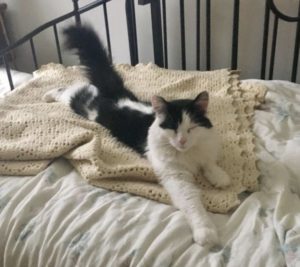Cats With PKD: Help For Apollo
What Is Feline Polycystic Kidney Disease?
My friend Ingrid reached out to me this week with some really sad news. Sadly, her daughter’s cat, Apollo, was diagnosed with PKD, polycystic kidney disease. He is only five years old. Needless to say her daughter is extremely upset that her precious kitty is facing such a grave diagnosis. Ingrid wanted to know if there was anything she could do holistically to support or slow down this fatal disease’s progression. Unfamiliar with it, I was curious to learn more about cats with PKD.
In PKD various amounts of sacks filled with fluid (cysts) develop inside the kidneys. These cysts can be small or large, and when they accumulate it impairs kidney function. As a result, this ultimately can lead to kidney failure. Some cats who develop a small amount of cysts and have limited kidney impairment can end up living a long time.

Apollo
Treatment for PKD in cats
Dr. Karen Becker, DVM, an integrative and proactive veterinarian recommends treating cats with PKD the same way you treat cats with chronic kidney disease: “controlling uremia (the buildup of nitrogenous waste products in the blood), delaying the progression of the disease and maintaining the cat’s quality of life.” Dr. Becker’s other recommendations for PKD cats include:
- Fluid therapy
- High quality protein diet with restricted amounts of phosphorus and sodium
- Access to fresh water
- Using a phosphorus binder in the food
- Using kidney-specific probiotics such as Azodyl
- Adding B vitamins to the food or subcutaneous fluids
- Kidney support supplements like Standard Process Feline Renal Support
The ideal diet for cats with PKD
The old school mindset of restricting protein amounts for cats with kidney disease is out. Therefore, a better approach is to offer a high quality, human grade, easily digestible protein. You can use a homemade raw or lightly cooked diet made without bones, or consider a kidney-friendly diet like Darwin’s Natural Pet Products. Darwin’s fresh, raw diet features appropriate protein amounts, restricted phosphorus, phosphorus binders, B-Vitamins, Omega 3 fatty acids and increased calcium levels that help minimize potassium absorption. I highly recommend avoiding kibble as a dry food diet puts too much strain on the kidneys.

Apollo
Apollo
I’m not sure of the severity of Apollo’s condition because I haven’t seen his ultrasound or reports. However, by muscle testing I was able to identify several ways to support him. Fortunately, his condition doesn’t appear to be too severe at this point because he did not test well for fluid therapy or B vitamins. However, there are several things that his body needs: high quality protein diet, fresh water, using a phosphorus binder (I like Phos Bind by Rx Vitamins), a probiotic like Azodyl, and kidney support supplements.
In addition, I tested both the Standard Process product above and a Chinese herbal supplement called Kidney Support Gold by Pet Wellbeing. Even though they both tested well, the Kidney Support Gold tested the best. Being curious if there were other natural remedies that may help, I kept digging.
Products that work well for humans can often work well in animals, too. You just need to adjust the dosage protocols. I found several homeopathic remedies that are used for PKD in humans to help treat symptoms, including Apis Mel, Arsenicum Album, Cantharis, Cuprum Arsenitum, Helleborus Niger, Kali Chloricum, Lycopodium Clavatum, Phosphorus, plus a few more. What was interesting is that while homeopathy tested well for Apollo’s condition, he doesn’t need it yet. If his condition progresses I would definitely re-test these remedies.

Apollo
CBD and PKD
Another surprise was CBD. I found an article pertaining to research using cannabis for PKD in humans.
While clinical studies on cannabis’ effect on polycystic kidney disease are lacking, findings in preclinical studies suggest cannabinoids found in cannabis could offer therapeutic benefits for treating kidney disease. Cannabinoids may effectively reduce oxidative stress, inflammation and cell death in the kidney, and improved renal function. These protective effects of cannabinoids are likely due to interaction with the endocannabinoid system’s CB2 receptors, which has been found effective at protecting the kidney from damage by minimizing inflammation and oxidative stress (Mukhopadhyay, et al., 2010).
Cannabis may also limit kidney damage caused by polycystic kidney disease by potentially lowering blood pressure. Studies have found that cannabinoids cause blood vessels to vasodilate, which in turn improves blood flow and reduces blood pressure (Herradon, Martin & Lopez-Miranda, 2007) (Batkai, et al., 2004).
Did Apollo test well for CBD? Yes! In fact, it was a VERY strong positive! Two CBD products for cats that I’ve researched and approve both tested well for him: Austin and Kat 100 mg CBD and HolistaPet 150 mg CBD Tincture. (To learn more about CBD and its use for cats read this article. Have a dog? Check out this page.)
Final thoughts
Apollo’s diagnosis was certainly not the one Ingrid’s daughter wanted or expected. Nevertheless, proper diet, supplementation, and a stress-free environment will be key in extending his life. Avoiding vaccines is also crucial due to the stress they put on the immune system and kidneys.
Do you have a cat with PKD? If so, have you tried any of the recommendations above? Leave a comment below!

